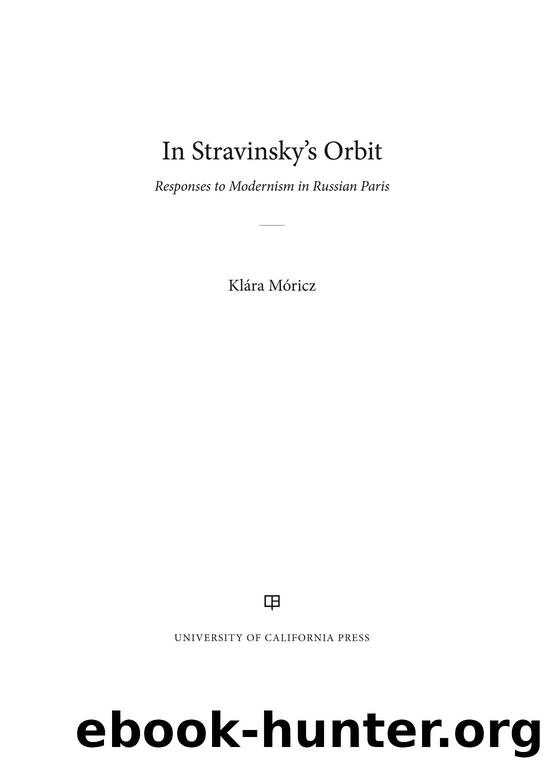In Stravinsky's Orbit by Klara Moricz;

Author:Klara Moricz;
Language: eng
Format: epub
ISBN: 9780520344426
Publisher: University of California Press
PARIS UNDER THE BANNER OF PUSHKIN
In Russia Abroad, Pushkin was the object of a veritable cult. In 1925 his birthday was designated a âDay of Russian Culture,â to be celebrated in all the worldâs capitals where Russians lived.6 Nineteenth-century nihilistic criticism of Pushkinâs lack of âsocial utilityâ made him dear to emigrants who detested Marxist interpretations of artâs social function. Especially since, as an aristocrat and an apologist for the tsarist system, Pushkin was initially ignored by the Bolsheviks, the emigrants could claim him as their own. Vladislav Khodasevich and Marina Tsvetayeva hailed his poetry as the model of formal excellence, and emigrant intellectuals found solace in his uncompromising individualism.7 This exclusive ownership changed in 1937 when Russia Abroad faced Soviet competition in celebrating the centenary of the poetâs death. The anniversary, announced as a worldwide celebration of Russiaâs national genius, highlighted even more painfully the unbridgeable divide between the two Russian cultures. For Russia Abroad, the celebration was meant to unify the diaspora and bolster what little political, social, and cultural coherence it still possessed. As K. Zaitsev wrote wishfully in his article âBattle for Pushkin,â âthe emigrants, like a military family, set aside their political differences in order to line up under the banner of Pushkin.â8
Yet while the Pushkin observances claimed to be apolitical in Russia Abroad, they nevertheless had to confront Soviet propaganda that used the occasion to appropriate the poet for its own political purposes. In the battle for Pushkin, Paris, the center of emigrant intellectual life and the organizational heart of the celebrations, turned out to be a complicated cultural terrain. The ideological split between Soviet and emigrant festivities created confusion in the French capital where Soviet Russia, through its embassy on Rue de Grenelle, had a sizable leverage on French intellectuals and the newly minted government, which, since the victory of the Popular Front in 1936, was eager to strengthen ties with the Soviet Union.
According to Lifar, sometime in the middle of 1934 he was invited to the apartment of Pavel Milyukov (1859â1943), founder and leader of the liberal Constitutional Democratic Party (Kadets) and Paris editor in chief of Posledniye novosti, to meet Vladimir Zeyeler (1874â1954), another member of the Kadets and secretary of the Central Committee of the Day of Russian Culture, and Mikhail Fyodorov (1858â1949), member of the Russian National Committee and one of the founders of the short-lived journal Borâba za Rossiyu (Fight for Russia).9 The meeting, Lifar writes, concerned the formation of a Pushkin Committee that would organize celebrations during the anniversary year. They invited Lifar in the hope that the dancer, together with such famous Russian artists as Feodor Chaliapin and Sergei Rachmaninoff, would lend artistic prestige to the events.
The chair of the Pushkin Committee became Vasily Maklakov (1869â1957), who had been a nonaccredited ambassador of the no-longer-extant tsarist Russia in Paris from 1917 through 1924. Maklakovâs ability to mediate between warring political factions of Russian emigrants and the French government made him a perfect choice to chair the committee.
Download
This site does not store any files on its server. We only index and link to content provided by other sites. Please contact the content providers to delete copyright contents if any and email us, we'll remove relevant links or contents immediately.
The Goal (Off-Campus #4) by Elle Kennedy(13660)
Kathy Andrews Collection by Kathy Andrews(11819)
Diary of a Player by Brad Paisley(7565)
Assassin’s Fate by Robin Hobb(6203)
What Does This Button Do? by Bruce Dickinson(6198)
Big Little Lies by Liane Moriarty(5795)
Altered Sensations by David Pantalony(5095)
Pale Blue Dot by Carl Sagan(5002)
Sticky Fingers by Joe Hagan(4192)
The Death of the Heart by Elizabeth Bowen(3612)
The Heroin Diaries by Nikki Sixx(3545)
Confessions of a Video Vixen by Karrine Steffans(3303)
Beneath These Shadows by Meghan March(3301)
How Music Works by David Byrne(3263)
The Help by Kathryn Stockett(3141)
Jam by Jam (epub)(3078)
Harry Potter 4 - Harry Potter and The Goblet of Fire by J.K.Rowling(3064)
Computational Linguistics and Intelligent Text Processing: 20th International Conference, CICLing 2019 La Rochelle, France, April 7â13, 2019 Revised Selected Papers, Part I by Alexander Gelbukh(2991)
Strange Fascination: David Bowie: The Definitive Story by David Buckley(2864)
